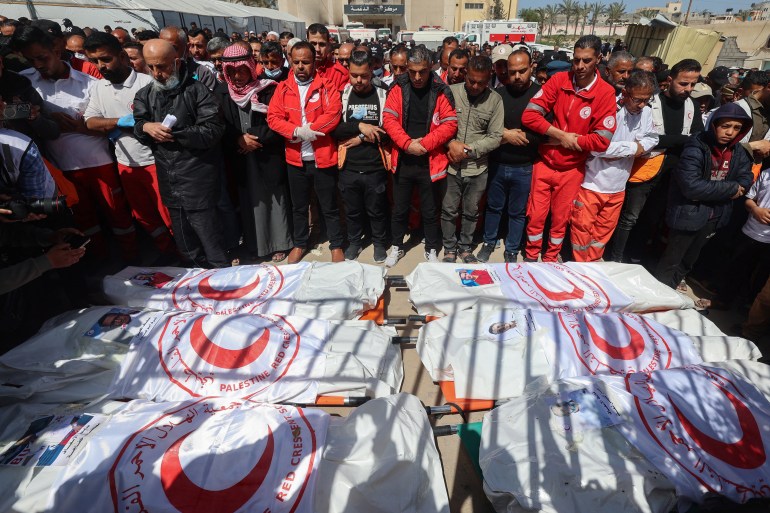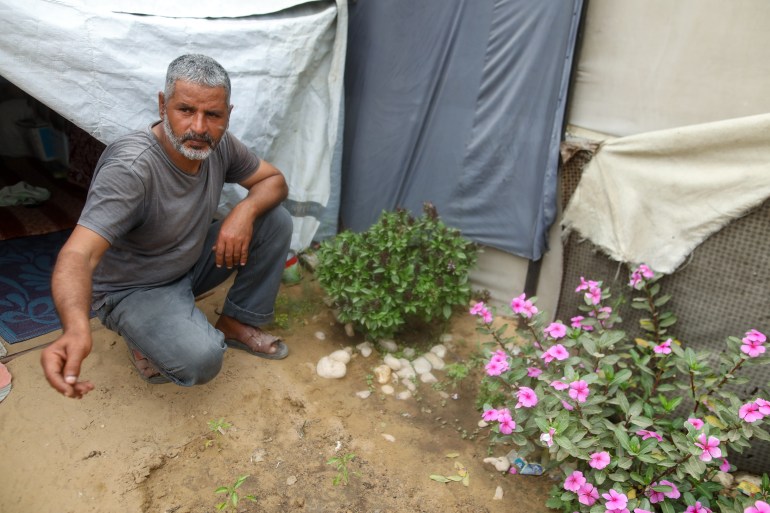Mawasi Khan Younis, Gaza – Her son’s final words haunt Ghalia Radwan.
“Forgive me, mama,” the 24-year-old said as he lay dying, shot by Israeli soldiers while he was on a rescue mission on March 23, which he recorded until his last breath.
He wanted her forgiveness for the pain his death would cause, knowing that she had worried about him every day since he had become a paramedic.
“I forgive you, son,” Ghalia has whispered tearfully countless times since then, knowing that Rifaat had wanted his conscience clear before he died in southern Gaza with 14 other emergency workers.
She hopes he knows she would always forgive him.
‘I felt like a dagger pierced my heart’
On the morning of March 22, Ghalia woke up later than usual and rushed to see Rifaat before he left for work.
But he had already left, and her heart filled with dread.
“I had kept looking over at him the night before as he was sleeping for some reason,” she says.
The night of March 21 was unremarkable. Rifaat came home in time to break his Ramadan fast with his family in the displacement tent they live in.
After the simple iftar meal, he talked with his parents a bit and then went to sleep.
“Even though I miss him terribly and always look forward to him getting home so we could chat, we always made sure not to tire him with talk or staying up late,” Rifaat’s father, 52-year-old Anwar Radwan, says.
Ghalia agrees: “I just would wash his clothes and prepare his sleeping spot, so he could go to work rested.”
She’s not sure but believes Rifaat woke up around dawn for suhoor, the daily meal before fasting begins during Ramadan, and was picked up by 6am by his colleagues to go to work. He didn’t come home after that shift, spending the night at the first responders centre instead.
On March 23, the family was told Rifaat was one of 15 Palestine Red Crescent Society and Civil Defence rescue workers who were missing and feared ambushed by Israeli soldiers.
That news launched the family into eight days of tormented waiting, praying and hoping that Rifaat would be found alive.
“I would pace back and forth, crying, praying and pleading with God, while constantly calling the Red Crescent,” Ghalia says of the wait while Palestinian authorities tried to get Israel to agree to a search operation. “Each time they told us Israeli coordination had been denied, I would faint from the sheer pain.”
![Forgive me mother [Yousef al-Zanoun/Al Jazeera]](https://www.occasionaldigest.com/wp-content/uploads/2025/04/8K4A0063-1744633109.jpg)
On the morning of Eid al-Fitr, the family got a call from the Red Crescent that Israeli permission had finally been granted for search teams to enter the area.
“I wouldn’t wish those agonising hours of waiting on any mother in the world,” Ghalia says.
There is no internet coverage in the family’s tent, so Anwar would have to go to an internet point in the camp to check for updates.
He came back to the tent at one point and said the Red Crescent had found two bodies, then rushed out again, leaving Ghalia praying desperately that Rifaat was not among them
The next time Anwar came back, he said four bodies had been recovered and rushed off again.
On his third trip back, he said they had recovered six bodies, including Rifaat’s.
“I felt like a dagger pierced my heart, but I resigned myself to God’s will, and we went to the hospital.”
At the hospital, the families of the other paramedics were waiting for their loved ones’ bodies to arrive.
“We all rushed towards the ambulances, crying. Emergency workers were weeping bitterly as they bid farewell to their colleagues.”
‘Forgive me’
As excruciating as the wait for news was, it was nothing compared with watching the video Rifaat had recorded of his last moments, which was found after his body was.
Over about 20 minutes, Rifaat can be heard speaking about the mission they were on.
An ambulance that had gone to the Tal as-Sultan area of southern Gaza to rescue survivors of an Israeli bombing had disappeared about 4am on March 23.
Another ambulance that went out to find it radioed back to base to say the missing colleagues seemed to have been shot, and two more ambulances were sent out to help them. Rifaat was in one.
His video clearly shows the worry in the ambulance and the fact that all the emergency vehicles – including a Civil Defence firetruck – were clearly marked and had their lights on, not off as Israel initially claimed as it tried to justify killing 15 emergency workers and burying them and their vehicles.
In the video, Ghalia was able to hear as her son spotted the bodies of his colleagues and see everyone in the ambulance rush out to help them as they were wearing clearly identifiable uniforms.

Then came the sound of gunfire, and Rifaat fell to the ground as the visuals were obscured and only his voice remained as he repeated the shahada, the Islamic declaration of faith, and begged his mother to forgive him.
“Forgive me, mama,” he said. “I wanted to help people. Forgive me.”
Both declarations are tied to Rifaat’s faith. The shahada is the most important declaration and prayer recited by Muslims. They also say it on their deathbeds to reaffirm their faith.
Muslims believe that the path to heaven is through their parents and through having lived a good life and not harming anyone, and Rifaat wanted to die knowing that his mother would forgive him in death.
“Rifaat knew how deeply attached I was to him and how I constantly worried about him, so his last words were asking for my forgiveness because he knew losing him would break my heart,” Ghalia tells Al Jazeera, her eyes brimming with tears.
The boy who became a paramedic
“My son was beautiful and charming. I adored him. He was handsome, generous and giving without limits,” Ghalia says.
Anwar remembers a child who always ran after ambulances, firetrucks, bulldozers, anything with flashing emergency lights and a siren.
“[Rifaat] loved emergency work, and when he finished high school, he chose that path.”
Ghalia worried when Rifaat chose emergency medical services, joining the Palestine Red Crescent Society in October 2023 when Israel’s war on Gaza began but relented when Rifaat showed how determined he was.
“He said the same thing to me then that he said in his final moments: ‘Mama, I want to help people.’”
Throughout Israel’s war, Ghalia constantly feared for Rifaat’s safety, warning him and begging him to stay safe.
Whenever he came home after a difficult day, Rifaat would tell his mother what he had seen as he tried to rescue people.
“I would wash his blood-soaked uniform while he apologised and told me how he retrieved the remains of children, women and men from beneath the rubble,” she said.
“He was often devastated, but he never gave up.”
Rifaat had dreamed of continuing his studies abroad, to learn more about emergency response and return to Gaza to bring his education home to give back to people, Ghalia says.
“[He was also] our sole breadwinner due to his father’s illness until he completely exhausted his bank account one day.

“I broke down crying, but he reassured me and said it was fine, that I shouldn’t be sad about the money.”
There’s pride in Ghalia when she talks about her son, taking comfort in the fact that he sacrificed himself to serve and help others.
“My son Rifaat’s message will live on, and I will raise my younger sons to follow in his footsteps and become paramedics,” Ghalia says, referring to her sons Abdul Jawwad, 13, and Suleiman, 11.
“Rifaat left us a noble message and an everlasting impact,” she adds.
“I always think of him whenever I see the flowers and plants he planted around our tent.”
